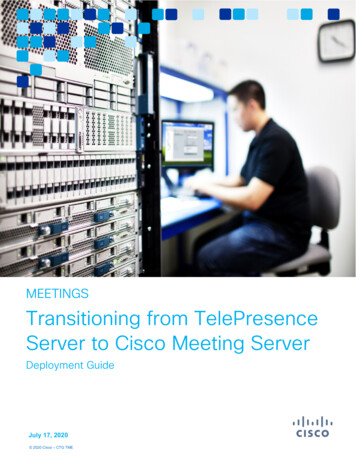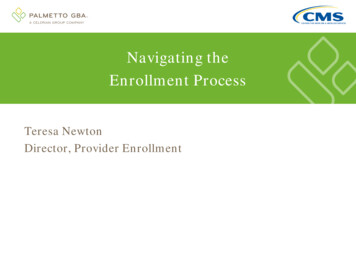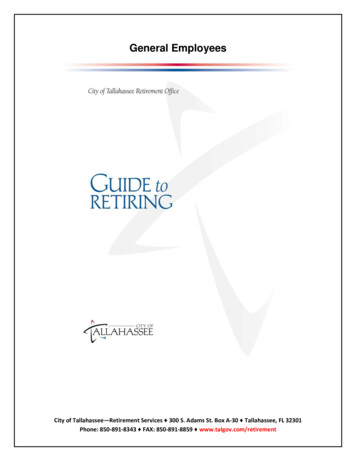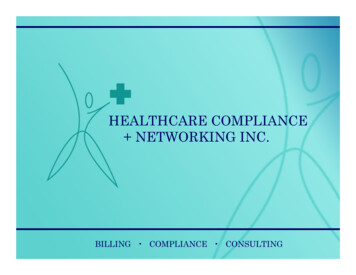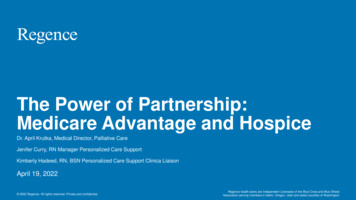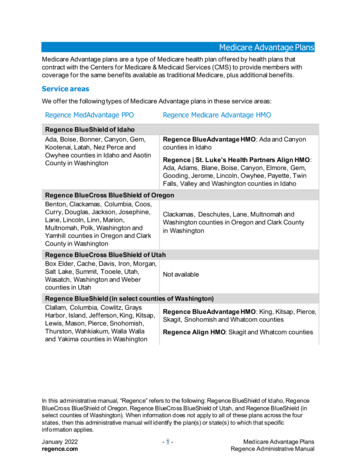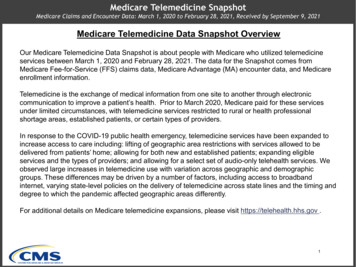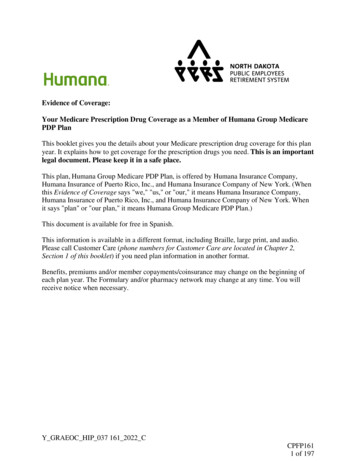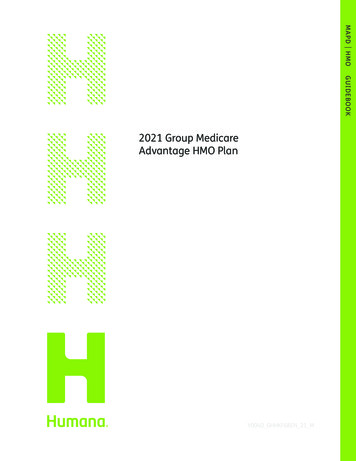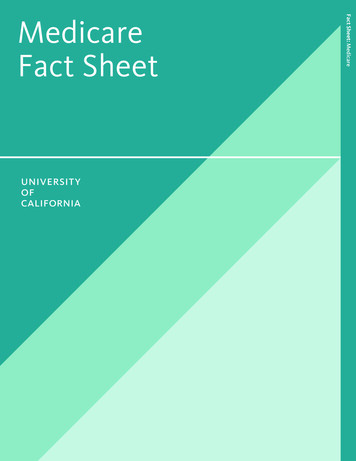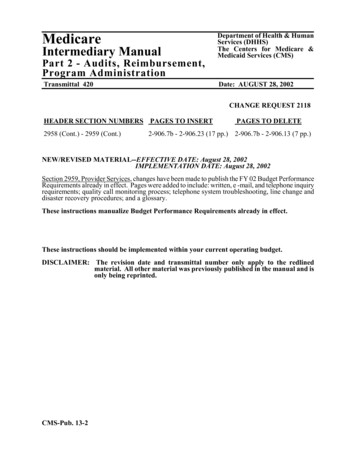
Transcription
MedicareIntermediary ManualDepartment of Health & HumanServices (DHHS)The Centers for Medicare &Medicaid Services (CMS)Transmittal 420Date: AUGUST 28, 2002Part 2 - Audits, Reimbursement,Program AdministrationCHANGE REQUEST 2118HEADER SECTION NUMBERS PAGES TO INSERT2958 (Cont.) - 2959 (Cont.)PAGES TO DELETE2-906.7b - 2-906.23 (17 pp.) 2-906.7b - 2-906.13 (7 pp.)NEW/REVISED MATERIAL--EFFECTIVE DATE: August 28, 2002IMPLEMENTATION DATE: August 28, 2002Section 2959, Provider Services, changes have been made to publish the FY 02 Budget PerformanceRequirements already in effect. Pages were added to include: written, e -mail, and telephone inquiryrequirements; quality call monitoring process; telephone system troubleshooting, line change anddisaster recovery procedures; and a glossary.These instructions manualize Budget Performance Requirements already in effect.These instructions should be implemented within your current operating budget.DISCLAIMER: The revision date and transmittal number only apply to the redlinedmaterial. All other material was previously published in the manual and isonly being reprinted.CMS-Pub. 13-2
08-02ADMINISTRATIVE GUIDES2958 (Cont.)complaint should be screened for billing errors or abuse before being sent to the Benefit IntegrityUnit. After screening has been performed, if abuse is suspected, the complaint would be handled bythe Medical Review Unit. If fraud is suspected, the complaint should be forwarded to the BenefitIntegrity Unit and the caller should be told the Benefit Integrity Unit will contact him/her about thecomplaint. Ask the caller to provide the Benefit Integrity Unit with any documentation he/she mayhave that substantiates the allegation. Give assurance that the matter will be investigated10. Equipment Requirements.--To ensure that inquiries receive accurate and timelyhandling, provide the following equipment:o On-line access to a computer terminal for each telephone representativeresponsible for claims-related inquiries to retrieve information on specific claims. Locate thecomputer terminal so that representatives can research data without leaving their seats;oAn outgoing line for call-backs; ando A supervisor's console for monitoring telephone representatives' accuracy,responsiveness, clarity, and tone.11. Telephone Directory Listings.--Effective with the publication of these instructions,intermediaries will not be responsible for the publication of their beneficiary inbound 800 service inany telephone directory. CMS will publish beneficiary inbound 800 numbers in the appropriatedirectories. No other listings are to be published by the intermediary.12. Telephone Inbound Service Costs.--Effective with the transition to FTS-2001 service,CMS will pay for the rental of T-1/PRI lines and all connect time charges. These costs will be paidcentrally by CMS and only for these telephone service costs. All other costs involved in providingtelephone service to Medicare beneficiaries will be born by the contractor. Since these costs are notspecifically identified in any cost reports, contractors must maintain records of all costs associatedwith providing telephone service to beneficiaries (e.g., costs for headsets) and provide thisinformation upon request by RO or CO.C.Walk-In Inquiries.--1. General.--Contractors should not actively publicize the walk-in function. However,give individuals making personal visits to you the same high level of service you would give throughphone contact. The interviewer must have the same records available as a telephone servicerepresentative to answer any questions regarding general program policy or specific claims-relatedissues.If a beneficiary inquires about a denied or reduced claim, give him/her the same careful attentiongiven during a "hearing," i.e., the opportunity to understand the decision made and an explanation ofany additional information which may be submitted when a review is sought.Make the same careful recording of the facts as for a telephone response, if it appears further contactor a review will be required.2.representative;Rev. 420Guidelines for High Quality Walk-In Service.-oAfter contact with a receptionist, the inquirer may meet with a service2-906.7b
2959ADMINISTRATIVE GUIDESando08-02oWaiting room accommodations must provide seating;oInquiries must be completed during the initial interview to the extent possible;Current Medicare publications must be available to the beneficiary.D. Surveys.--CMS requires annual surveys of customer service operations to be completed byeach contractor within the time frames and areas indicated on the specific notice. Examples includeannual call center technology surveys, staffing profiles, training needs, etc.2959.PROVIDER SERVICESEvery member of your customer service team should be committed to providing the highest level ofservice to our partner, the Medicare provider. This commitment should be reflected in the manner inwhich you handle each provider inquiry. The following guidelines are designed to help you ensurethat this high level of service is provided.A. Written Inquiries.-1. Guidelines for Handling Written Inquiries.--Stamp all written inquiries with the dateof receipt in the corporate mailroom and control them until you send final answers. In addition:oAnswer inquiries timely;oDo not send handwritten responses;oInclude a contact's name and telephone number in the response;oConsider written appeal requests as valid if all requirements for filing are met.These requests need not be submitted on prescribed forms to be considered valid. If appeal requestsare valid, they are not to be considered written inquiries for workload reporting. They should beforwarded to your appeals unit for handling.oInclude the CMS alpha representation on all responses.oKeep responses in a format from which reproduction is possible.2. Guidelines for High Quality Written Responses to Inquiries.--Contractors must have acorrespondence quality control program (containing written policies and procedures) that is designedto improve the quality of written responses. In addition, contractors must perform a continuousquality review of outgoing letters, computer notices, and responses to requests for appeals of initialdeterminations. These responses should be reviewed based on the following elements:a. Accuracy.--Content is correct with regard to Medicare policy and your data.Overall, the information broadened the inquirer's understanding of the issues that prompted theinquiry.b. Responsiveness.--The response addresses the inquirer's major concerns andstates an appropriate action to be taken.2-906.8Rev. 420
08-02ADMINISTRATIVE GUIDES2959 (Cont.)c. Clarity.--Letters have good grammatical construction, sentences are of varyinglength (as a general rule, keep the average length of sentences to no more than 12-15 words), andparagraphs generally contain no more than five sentences. All written inquiries are to be processedusing a font size of 12 and a font style of Universal or Times New Roman or another similar style forease of reading by the provider.d. Timeliness.--Substantive action is taken and an interim or final response is sentwithin 45 calendar days from receipt of the inquiry. In instances where a final response cannot besent within 45 calendar days (e.g., inquiry must be referred to a specialized unit for response), sendan interim response acknowledging receipt of the inquiry and the reason for any delay.If you are responsible for handling both Part A and Part B claims, inquiries requiring response fromboth of these areas share the same timeframe for response (i.e., the 45 -day period starts on the sameday for both responses).Ensure that the inquiry is provided to both responding units as quickly as possible. The response tothese inquiries may be combined, or separate, depending on which procedure is most efficient foryour conditions. If you respond separately, each response must refer to the fact that the other area ofinquiry will be responded to separately.Every contractor will have the flexibility to respond to provider written inquiries by phone within 45calendar days. A report of contact should be developed for tracking purposes. The report of contactshould include the following information: Provider’s name and address, telephone number, providernumber, date of contact, internal inquiry control number, subject, summary of discussion, status,action required (if any) and the name of the customer service representative who handled the inquiry.Upon request, send the provider a copy of the report of contact that results from the telephoneresponse. The report of contact should be retained in the same manner and time frame as the currentprocess for written responses. Use your discretion when identifying which written inquiries (i.e.,provider correspondence that represent simple questions) can be responded to by phone. Use thecorrespondence, which includes the requestor's telephone number or use a requestor's telephonenumber from internal records if more appropriate for telephone responses. If you cannot reach therequestor by phone, do not leave a message for the provider to return the call. A written responseshould be developed within 45 calendar days from the incoming inquiry if the matter cannot beresolved by phone.e. Tone.--Tone is the touch that brings communication to a personal level andremoves the appearance that a machine-produced response was used. Appraise all responses,including computer-generated letters and form letters, for tone to make them user-friendly andcomprehensible by the reader.f. E-mail Inquiries.--Any e-mail inquiry received can be responded to by e-mail.Since e-mail represents official correspondence with the public, it is paramount that contractors usesound e-mail practices and proper etiquette when communicating electronically. Responses that arepersonal in nature (contain financial information, HIC#, etc.) cannot be answered by e-mail. Ensurethat all e-mail responses utilize the same guidelines that pertain to written inquiries (i.e., timeliness,accuracy, clarity, tone, comprehension).B. Telephone Inquiries.--The guidelines established below apply to all calls to telephonenumbers established as provider inquiry numbers. The standards do not apply to those inquirieshandled by other units within the contractor (i.e., appeals, fraud, MSP). To ensure all inquiries arehandled as expeditiously as possible, inbound provider inquiry numbers (and the lines) must beseparate from beneficiary inquiry numbers. Beneficiaries should not use numbers established forinquiries from providers.Rev. 4202-906.9
2959 (Cont.)ADMINISTRATIVE GUIDES08-021. Availability of Telephone Service.--Make live telephone service available to callerscontinuously during normal business hours--including break and lunch periods. Call centerstaffing should be based on the pattern of incoming calls per hour and day of the week ensuring thatadequate coverage of incoming calls throughout the workday is maintained in accordance with callcenter standards. Telephone service must not be interrupted in order to conduct CSR training.On Federal holidays, in lieu of answering telephone inquiries, contractors may choose to performother appropriate call center work, e.g., provide CSR training.Although the provider should have the ability to speak with a CSR during operating hours,automated “self-help” tools, such as interactive voice response (IVR) units, may also be used toassist with inquiries. Contractors are encouraged to increase the use of existing IVRs based uponlessons learned and “best practices” throughout CMS and its partners. The IVRs should be updatedto address areas of provider confusion as determined through the contractor’s inquiry analysis staffand CMS best practices.Part A intermediaries utilizing IVR technology to assist providers in obtaining answers to variousMedicare questions, should offer the following information:o Contractor hours of operations for live service, provided after hours or during peak timeswhen a caller is waiting on hold;o General Medicare program information;o Specific information regarding claims in process and claims completed;o A statement if additional evidence needed to have a claim processed; ando General information about appeal rights and actions required of a provider to exercisethese rights.It is recommended the IVR be available to providers from 6 a.m. to 10 p.m. in their local prevailingtime, Monday through Friday, and from 6 a.m. to 6 p.m. on weekends and holidays.Allowances for claims processing system and mainframe availability, as well as for normal IVR andsystem maintenance shall be made. Contractors should identify what services can be provided toproviders during times when the processing system is not available. Contractors should also printand distribute a readily understood IVR operating guide to Medicare providers upon request.Intermediaries utilizing IVR technology should report the IVR handle rate. This is the number ofcalls delivered to the IVR where providers received the information they required from theautomated system.2. Toll-Free Telephone Service.--CMS provides toll-free service for providers to all PartA intermediaries. This is accomplished through a government-wide telephone contract negotiated byGeneral Services Administration. This service is known as FTS 2001. The costs associated with theinstallation and monthly fees for this toll-free service will be paid centrally by CMS. However,Medicare contractors will still be responsible for all other internal wiring and equipment (ACD, IVR,PBX, etc.) and any local telephone services and line charges.Any toll-free Medicare provider customer service number provided and paid for by CMS must beprinted on all provider notices and the contractor’s website immediately upon activation. Displaythis toll-free number prominently so the reader will know whom to contact regarding the notice.2-906.10Rev. 420
08-02ADMINISTRATIVE GUIDES2959 (Cont.)3. Inquiry Staff Qualifications.--Train CSRs to respond to provider questions, whetherof a substantive nature, a procedural nature, or both. CSRs who answer telephone calls must bequalified to answer general questions about initial claims determinations, operation of the Medicareprogram, and appeal rights and procedures. To ensure that these services are provided, CSRs shouldhave the following qualifications:ooooGood telephone communications skills;Sensitivity for special concerns of the Medicare providers;Flexibility to handle different situations that may arise; andExperience in Medicare claims processing and review procedures.Prior experience in positions where the above skills are used, e.g., claims representative or telephoneoperator, is desired, but not required.Contractors are required to provide a training program which includes technical instructions onMedicare eligibility, coverage, benefits, claims processing, Medicare systems and administration,use of the Medicare Intermediary Manual , telephone techniques, and the use of a computer terminal.A proficiency test should be developed for new CSRs and as needed for existing personnel.4. Guidelines for High Quality Telephone Service.--Handle all provider telephoneinquiries in accordance with the guidelines shown below. All tasks related to this activity aremandatory and shall be reported to CMS on a monthly basis. Standard definitions and detailedcalculations for each of the required telephone customer service data elements are included as part ofthe Glossary.Report total calls offered to the provider call center for the month, defined as the number of calls thatreach the call center’s telephone system, which can be split up according to trunk lines in instanceswhere a call center is taking calls for Part A, B and other non-CMS calls.Program all systems related to inbound provider calls to the center to acknowledge each call within20 seconds (four rings) before a CSR, IVR or automated call distributor (ACD) prompt is reached.This measure may not be required to be reported, but must be substantiated when requested.For callers choosing to talk with a CSR, answer no less than 85% of calls within the first 60 seconds.This rate should be reported to CMS monthly.Provide a recorded message, advising callers in queue to speak with a CSR of any temporary delaybefore a CSR is available. During peak volume periods, indicate in the message a preferred time tocall.NOTE: Program the IVR to provide callers with an after-hours message indicating normal businesshours. It is not necessary to duplicate this message if the caller is informed of the normalbusiness hours via the telephone system prior to being delivered to the IVRs. If call centershave IVRs that allow the recording of messages, this service should be discontinued.Report call abandonment rate, which is the percentage of provider calls that abandon their call fromthe ACD queue. This should be reported as two separate measures:1.2.Rev. 420Calls abandoned up to and including 60 seconds;Calls abandoned after 60 seconds.2-906.11
2959 (Cont.)ADMINISTRATIVE GUIDES08-02Report the monthly average speed of answer. This is the amount of time that all calls waited beforebeing connected to a CSR. It includes ringing, delay recorder(s) and music.The CSRs must identify themselves when answering a call, however the use of both first and lastnames in the greeting will be optional. In order to provide a unique identity for each CSR foraccountability purposes, where a number of CSRs have the same first name, it is suggested that theCSRs also use the initial of their surname. If the caller specifically requests that a CSR identifyhimself/herself, the CSR should provide both first and last name. Where the personal safety of theCSR is an issue, call center management should permit the CSR to use an alias. This alias must beknown for remote monitoring purposes. The CSRs should also follow local procedures forescalating calls to supervisors or managers in situations where warranted.Report monthly average talk time (which includes any time the caller is placed on hold by the CSR).Handle no less than 80 percent of calls to completion during the initial call - minimizing transfers,referrals and callbacks. This rate should be reported to CMS monthly.Report call center handling productivity, calculated by the total calls handled divided by the totalCSR FTEs in the center.Report occupancy rate, the percent of time that CSRs spend in active call handling (i.e., on incomingcalls, after call work or outbound calls).Report monthly average after call work time (wrap-time), which includes all the time that the CSRneeds to complete all administrative work associated with call activity after the customerdisconnects.Report monthly the status of those calls not resolved at first contact. Those calls should be reportedas follows:1. Callbacks required. This number is based on calls received for the calendar month andrepresents the number requiring a callback as of the last workday of the month.2. Callbacks closed within 5 workdays. This number is based on calls received for thecalendar month and represents the number closed as of the last workday of the month.As needed, develop a corrective action plan to resolve deficient performance in the call center, andmaintain results on file for regional office (RO) review.Develop a proficiency test to be used for new CSRs and as needed for existing personnel. This testshould include questions regarding basic aspects of the Medicare program such as benefits andclaims processing; review procedures; questions to indicate familiarity with the system and ability tolocate and interpret output; how to read information in the computer system and interpret beneficiaryfile material; new legislation or changes to policy and procedures; and include problems to solvewhich indicate ability to handle different situations that may arise such as seeking additionalinformation, referring to specialized staff or involving Benefit Integrity Unit.5. Quality Call Monitoring Process.--Contractors should measure and report the qualityof service continuously by employing the quality call monitoring (QCM) process.2-906.12Rev. 420
08-20ADMINISTRATIVE GUIDES2959 (Cont.)Monitor an average of nine calls per CSR per quarter for quality. The CSRs who answer bothbeneficiary and provider calls need only to be monitored for an average of nine calls per quarter.Focus monitoring efforts on new or other at-risk CSRs who would have the greatest potential tobenefit from any feedback while reducing the monitoring frequency on experienced CSRs who havedemonstrated a less significant need to be monitored. Individual CSR data shall be analyzedregularly, areas needing improvement identified, and corrective action plans should be implementedand documented.The sampling routine must ensure that CSRs are monitored at the beginning, middle and end of themonth (ensuring that assessments are distributed throughout the week) and during morning andafternoon hours).Participate in national and regional calibration sessions organized by CMS. Conduct regularmonthly calibration sessions.Monitor the calls in any combination of the following ways: live remote, live side-by-side (shadow),or taped. Record all monitored calls on the standard scorecard, using the QCM chart as a guideline.Complete the scorecard in its entirety and give feedback to the CSR in a timely fashion, coachingand assisting the CSR to improve in areas detected during monitoring.Copies of the scorecard and chart may be obtained at the telephone customer service Web site athttps://www.hcfa.gov/medicare/callcenter. Use only the official version of the scorecard posted atthe website. Train every CSR and auditor on the scorecard and chart and ensure that each person hasa copy of the chart available for reference.Where possible, rotate auditors regularly among the CSRs. Analyze individual CSR data regularly,identify areas needing improvement, implement and document corrective action plans. AnalyzeQCM data routinely to determine where training is needed, whether at the individual, team, or callcenter level.6. Calls Regarding Claims.--When a telephone representative receives an inquiry from aprovider about a claim, first, verify the provider’s name, identification number, and note the nameand title of the caller. Any information regarding the claim, including why the claim was reduced ordenied, may then be discussed with the caller.7. Calls Regarding Fraud and Abuse.--If a caller indicates an item or service was notreceived, or that a beneficiary or another provider is involved in some potential fraudulent activity,the complaint should be screened for billing errors or abuse before being sent to the Benefit IntegrityUnit. After screening has been performed, if abuse is suspected, the Medical Review Unit wouldhandle the complaint. If fraud is suspected, the complaint should be forwarded to the BenefitIntegrity Unit and the caller should be told the Benefit Integrity Unit will contact him/her about thecomplaint. Ask the caller to provide the Benefit Integrity Unit with any documentation he/she mayhave that substantiates the allegation. Give assurance that the matter will be investigated.8. Equipment Requirements.--To ensure that inquiries receive accurate and timelyhandling, provide the following equipment:o On-line access to a computer terminal for each telephone representativeresponsible for claims-related inquiries to retrieve information on specific claims. Locate thecomputer terminal so that representatives can research data without leaving their seats;oAn outgoing line for call-backs; ando A supervisor's console for monitoring telephone representatives' accuracy,responsiveness, clarity, and tone.Rev. 4202-906.13
2959 (Cont.)ADMINISTRATIVE GUIDES08-029. Publicizing Provider Toll Free Lines.--Effective with the publication of theseinstructions, intermediaries will not be responsible for the publication of their provider inbound 800service. The CMS will publish provider inbound 800 numbers in the appropriate directories. Noother listings are to be published by the intermediary.However, publicizing the toll-free service to the providers you serve is mandatory. Anannouncement about the availability of the service should be prominently displayed and maintainedon your Medicare Web site. Toll-free numbers should also be displayed on all provider educationmaterials. Finally, you should publicize the toll-free numbers at all scheduled provider conferences,meetings and workshops.10. Telephone Inbound Service Costs.--The CMS will pay for all costs associated withprovisioning FTS 2001 toll free services. All other costs involved in providing telephone service toMedicare provider will be the responsibility of the contractor. Since these costs are not specificallyidentified in any cost reports, contractors must maintain records of all costs associated withproviding telephone service to providers (e.g., costs for headsets) and provide this information uponrequest by RO or CO.11. Telephone Service Costs.--The costs involved in providing telephone service toMedicare providers vary considerably from location to location. These costs are not specificallyidentified in any cost reports. Therefore, maintain records of all costs associated with providingtelephone service to providers (e.g., costs per line, costs per call). When requested by RO or CO,provide this information.C.Processes for Line Changes, Troubleshooting and Disaster Recovery.--1. Ordering more lines, changing configurations, or disconnecting lines.--The initialinstallation of provider toll free lines at contractor sites has been completed. The ongoingmanagement of the entire provider toll free system requires a process for making changes, whichmay be either contractor initiated or CMS-initiated.The CMS-initiated changes (i.e., adding lines, removing lines, reconfiguring trunk groups) will bebased upon an analysis by CO of the data that contractors are now required to report as well asanticipated new reporting requirements as follows. Contractors are to report information on theirtelephone systems and CSRs performance to CMS.Any contractor-initiated changes should include an additional analysis of the existing telephoneenvironment and traffic patterns specific to the service being requested. In requesting changes to thephone environment, the contractor should follow the process outlined below.You will provide an analysis of their current telephone environment including a detailed trafficreport that shows the need for changes to their phone system (i.e., additional lines, trunk groupreconfiguration). This information should be gathered at the contractor site through the contractor’sswitch reporting as well as through Interact.The CMS will review your request and recommend approval, revisions or disapproval. Based ontechnical merit and availability of funds, CO will review the recommendation and make adetermination.In cases where the request is approved, CO will forward approved requests to the designated agencyrepresentative (DAR) for order issuance. In all cases, CO will notify the RO of the outcome.2-906.14Rev. 420
08-02ADMINISTRATIVE GUIDES2959 (Cont.)2. Troubleshooting.--To ensure that provider toll free service is available and clear,CMS established the Provider Incident Reporting & Response System (PIRRS). The PIRRSestablishes a standard, incident response and resolution system for Medicare contractors who aretroubleshooting problems and processing required changes for the toll free provider lines.The CMS has assembled a multi-functional team, consisting of both WorldCom telecommunicationssupport and CMS technical support contractor (TSC) personnel; to quickly and effectively resolvereported problems. To report and monitor a problem, follow these steps:Troubleshooting StepsStep 1 - Identify the cause and whether it is caused by internal customer premise equipment or tollfree network service:Internal ProblemToll-Free Network Service ProblemYour local telecommunications personnel Report the problem to WorldCom byshould resolve, but report per steps below. calling 1-888-387-7821.Step 2 – Involve CMS’s TSC, if needed to answer technical questions or to facilitate discussionswith WorldCom.Step 3 – File an incident report with the TSC for major interruptions of service. The TSC will notifyCMS staff. Major interruption of service is defined as any incident with a trouble ticket opened formore than 24 hours or a total loss of service.Step 4 - Utilize Interact Service Inquiry to review documentation, track trouble tickets status, orclose a trouble ticket online.Step 5 - File a monthly report with CMS about interruption of service - including both those ofWorldCom and in-house origins and send a copy to your RO.3. Disaster Recovery.--When a call center is faced with a situation that results in a majordisruption of service, it is imperative that the call center take the necessary action to ensure thatcallers are made aware of the situation.This service is intended to supplement your existing disaster recovery or contingency plans.Whenever possible, the call center is responsible for activating its own emergency messages or rerouting calls. However, when this is not possible and providers are unable to reach the call centerswitch, the call center must contact the Beneficiary Network Services Center (BNS) and request thatthey initiate a pre-scripted disaster recovery message based in the FTS 2001 network. Once theproblem is resolved, the call center must also contact the BNS to de-activate the FTS 2001 networkdisaster messages.For provider call centers, note that the BNS should only be contacted for the disaster situations andwill manage only these types of requests. The single point of contact was designed to streamline theprocess for shared call centers and avoid making two calls in an emergency situation. The BNS willcontact
Medicare Department of Health & Human Services (DHHS) Intermediary Manual The Centers for Medicare & Medicaid Services (CMS) Part 2 - Audits, Reimbursement, Program Administration . such as interactive voice response (IVR) units, may also be used to assist with inquiries. Contractors are encouraged to increase the use of existing IVRs based upon
